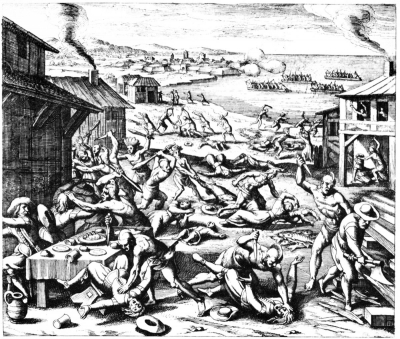The Colony of Virginia, chartered in 1606 and settled in 1607, was the first enduring English colony in North America, following failed proprietary attempts at settlement on Newfoundland by Sir Humphrey Gilbert in 1583, and the subsequent farther south Roanoke Island (modern eastern North Carolina) by Sir Walter Raleigh in the late 1580s.
The founder of the new colony was the Virginia Company, with the first two settlements in Jamestown on the north bank of the James River and Popham Colony on the Kennebec River in modern-day Maine, both in 1607. The Popham colony quickly failed due to a famine, disease, and conflicts with local Native American tribes in the first two years. Jamestown occupied land belonging to the Powhatan Confederacy, and was also at the brink of failure before the arrival of a new group of settlers and supplies by ship in 1610. Tobacco became Virginia's first profitable export, the production of which had a significant impact on the society and settlement patterns.
In 1624, the Virginia Company's charter was revoked by King James I, and the Virginia colony was transferred to royal authority as a crown colony. After the English Civil War in the 1640s and 50s, the Virginia colony was nicknamed "The Old Dominion" by King Charles II for its perceived loyalty to the English monarchy during the era of the Protectorate and Commonwealth of England.From 1619 to 1775/1776, the colonial legislature of Virginia was the General Assembly, which governed in conjunction with a colonial governor. Jamestown on the James River remained the capital of the Virginia colony until 1699; from 1699 until its dissolution the capital was in Williamsburg. The colony experienced its first major political turmoil with Bacon's Rebellion of 1676.
After declaring independence from the Kingdom of Great Britain in 1775, before the Declaration of Independence was officially adopted, the Virginia colony became the Commonwealth of Virginia, one of the original thirteen states of the United States, adopting as its official slogan "The Old Dominion". The entire modern states of West Virginia, Kentucky, Indiana and Illinois, and portions of Ohio and Western Pennsylvania were later created from the territory encompassed, or claimed by, the colony of Virginia at the time of further American independence in July 1776.
The Anglo–Powhatan Wars were three wars fought between settlers of the Virginia Colony and Algonquin Indians of the Powhatan Confederacy in the early seventeenth century. The first war started in 1609 and ended in a peace settlement in 1614. The second war lasted from 1622 to 1626. The third war lasted from 1644 until 1646 and ended when Opechancanough was captured and killed. That war resulted in a defined boundary between the Indians and colonial lands that could only be crossed for official business with a special pass. This situation lasted until 1677 and the Treaty of Middle Plantation which established Indian reservations following Bacon's Rebellion.

1610Aug, 9
The First Anglo-Powhatan War begins in colonial Virginia.
Choose Another Date
Events on 1610
- 7Jan
Galilean moons
Galileo Galilei makes his first observation of the four Galilean moons: Ganymede, Callisto, Io and Europa, although he is not able to distinguish the last two until the following day. - 2Aug
Northwest Passage
During Henry Hudson's search for the Northwest Passage, he sails into what is now known as Hudson Bay. - 9Aug
Colony of Virginia
The First Anglo-Powhatan War begins in colonial Virginia.

 English
English  español
español  français
français  português
português  русский
русский  العربية
العربية  简体中文
简体中文 